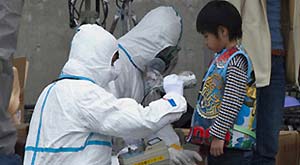Nuclear Crisis May Be 'Out of Control'
Xinhua News Agency, March 17, 2011 Adjust font size:
At the Fukushima plant, authorities have spent days desperately trying to prevent water, used to cool radioactive cores of the reactors, from evaporating, which would lead to overheating and possibly a meltdown.
Until the heightened alarm about No 3 reactor, concern had centered on damage to a part of the No 4 reactor building where spent rods were being stored in pools of water, and also to part of the No 2 reactor that helps to cool and trap the majority of cesium, iodine and strontium in its water.
Concern has mounted that the skeleton crews dealing with the crisis might not be big enough or were exhausted after working for days since the earthquake on Friday damaged the facility. Authorities withdrew 750 workers on Tuesday, leaving only 50.
All those remaining were pulled out for almost an hour on Wednesday because radiation levels were too high, but they were later allowed to return.
Medical staff use a Geiger counter to screen a woman for possible radiation exposure at a public welfare centre in Hitachi City, Ibaraki, March 16, 2011, after she evacuated from an area within 20km (12.4 miles) radius of the Fukushima Daiichi nuclear plant. [Photo/Agencies]
In the first hint of international frustration at the pace of updates from Japan, Yukiya Amano, director general of the International Atomic Energy Agency, said he wanted more timely and detailed information.
"We do not have all the details of the information so what we can do is limited," Amano told a news conference in Vienna. "I am trying to further improve the communication."
Several experts said the Japanese authorities were underplaying the severity of the incident, particularly on a scale called INES used to rank nuclear incidents. The Japanese have so far rated the accident a four on a one-to-seven scale, but that rating was issued on Saturday and since then the situation has worsened dramatically.
France's nuclear safety authority, ASN, said on Tuesday it should be classed as a level-six incident.
The French government said on Wednesday that Japan was losing control of the situation and urged its nationals in Tokyo to leave the country.
French Industry Minister Eric Besson said: "Let's not beat about the bush. They have visibly lost the essential control (of the situation). That is our analysis, in any case, it's not what they are saying."
Officials in Tokyo said radiation in the capital was 10 times normal at one point but not a threat to human health in the sprawling high-tech city of 13 million people.
Meanwhile, China will give 10,000 tons of diesel and 10,000 tons of gasoline free to Japan to help the country battle shortages, the Xinhua News Agency said on Wednesday.
State oil firms PetroChina and Sinopec will provide the fuel to Japan, it said, adding that China will offer more aid based on the needs of Japan.


